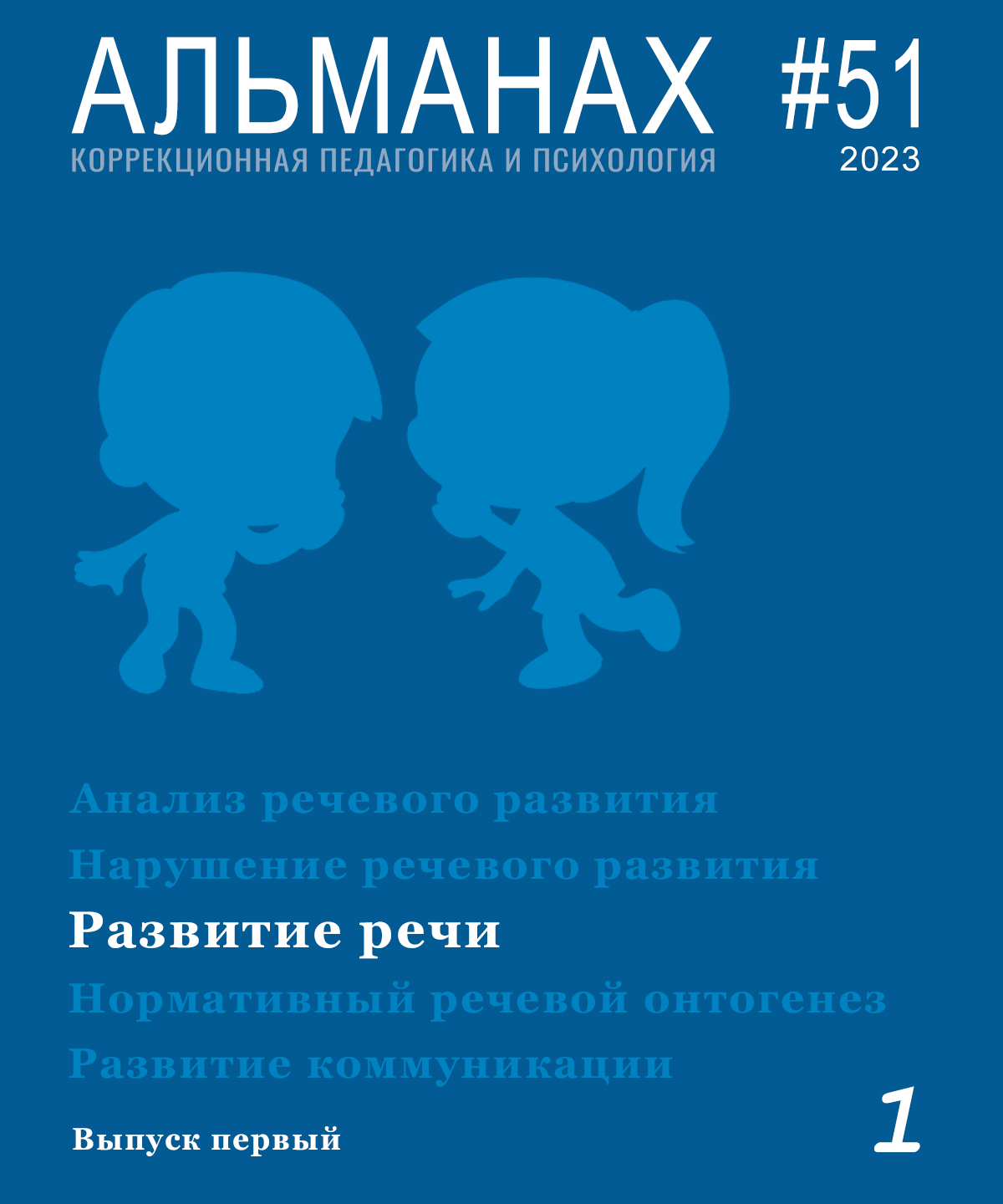Speech development
Almanac 51 · Issue #1 · 2023

Analysis of the speech development of a child: modern ideas of the national scientific school
Keywords
Analysis of the speech development of a child: modern ideas of the national scientific school
L.S. VygotskyR.E. Levina
children with speech development disorders
communicative behavior
diagnosis and correction of speech disorders
speech therapy
correctional pedagogy.
Four-component characteristics of normative speech ontogenesis as a landmark for a defectologist
For the first time, a consistent description of the three levels of normal speech development of a child, necessary for a defectologist, is presented in the context of the theory of L.S. Vygotsky, R.E. Levina and on the basis of modern research data. The description of each level includes: a description of the psycho-physiological prerequisites, the conditions for the child's speech development - the communicative situation of his development, the communicative behavior of the child himself and the means of language mastered by him. The presented logic of analysis and the specific characteristics of all three levels of speech ontogenesis allow the defectologist to use the description practically in the course of diagnosis and planning of corrective work not only with the child, but also with his environment, to justify the need for interaction with the doctor.
Keywords
Four-component characteristics of normative speech ontogenesis as a landmark for a defectologist
communicationspeech development
conditions for speech development
child's communicative behavior
parents' communicative behavior
speech development disorders
Four-component analysis of the speech development of a child with OHP and substantiation of correctional tasks
Keywords
Four-component analysis of the speech development of a child with OHP and substantiation of correctional tasks
R.E. Levinachildren with speech development disorders
general underdevelopment of speech
communicative behavior
diagnosis and correction of speech disorders
speech therapy
correctional pedagogy
Special educational needs of children with mental retardation in the field of communication
Sound design of educational programs for preschoolers with mental retardation requires an understanding of the uniqueness of their development and special educational needs.
The purpose of the article is to show the transformation of data on the gap between the linguistic and socio–linguistic components of the speech competence of preschoolers with mental retardation into ideas about the content of their special educational needs in the field of communication and speech development.
The conducted research is based on the cultural and historical approach of L. S. Vygotsky in his modern interpretation in special psychology and pedagogy.
The peculiarity of the development and imbalance of the socio-linguistic and linguistic components of the speech competence of children with mental retardation are shown and their special educational needs in this area of preschool education are determined. This makes it possible to reasonably reconstruct the established practice, avoiding unjustified focus on the development of vocabulary, grammar, phonetics and moving on to recreating psychological conditions in training for the coordinated development of communication, speech and correction of their shortcomings.
Keywords
Special educational needs of children with mental retardation in the field of communication
mental retardationcommunication
speech means
special educational needs
speech competence
Сommunicative-speech skills of preschoolers with developmental delay: implementation in situations of cooperation with peers and adults
Keywords
Сommunicative-speech skills of preschoolers with developmental delay: implementation in situations of cooperation with peers and adults
Сommunicative-speech skills of preschoolers with developmental delay: implementation in situations of cooperation with peers and adults Publisher: Almanac of the institute of special educationDevelopment of the communicative component of social competence in younger schoolchildren with intellectual disabilities
In the article, in the context of ideas about the child's social competence as a multicomponent personal property, manifested in the ability to mobilize acquired knowledge and experience in life and activity, including in interaction with peers and adults, the results of an experimental study of the development of communicative component in younger schoolchildren with mental retardation are shown.
Empirical data received from the study of 68 younger schoolchildren with mental retardation based on the results of two survey sections implemented during 2 years of their education indicate positive dynamics in the development of the communicative component of social competence in all children participating in the experiment, in its conditionality by carrying out purposeful work on the formation of this component, including game.
The data on the connection of communicative competence with cognitive, content, activity and emotional competence are presented, in the context of which possible ways of using these connections in the practical work of a teacher are offered. Conclusion: using games in the process of forming communicative competence in younger schoolchildren with mental retardation is advisable.
Keywords
Development of the communicative component of social competence in younger schoolchildren with intellectual disabilities
younger schoolchildren with mental retardationsocial competence
communicative competence
game
The role of forecasting in the social interaction of children with special needs
One of the barriers preventing the socialization of children with disabilities is a violation of speech communication, which is characteristic of children, developing in conditions of dysontogenesis. In solving the problems of socialization of children with disabilities, which includes the development, formation and consolidation of communication skills, self-service, planning, compliance with norms and rules, we set ourselves the task of finding resources that contribute to their positive socialization. Analysis of external factors and internal conditions of socialization of children with disabilities allowed us to turn to such a psychological phenomenon as "forecasting", which determines the success of adaptation to the outside world. In modern research, there is a connection between a sufficient level of development of a children prognosis and the success of their socialization.
The systemic nature of forecasting, which includes cognitive, emotional, personal components, makes it possible to consider it as an indicator of orientation in the social environment. Forecasting allows children with disabilities to anticipate the development of future events, the actions of participants in them, anticipate the consequences of their own actions, and build socially acceptable strategies for interacting with adults and peers.
Keywords
The role of forecasting in the social interaction of children with special needs
forecastingsocialization
disabilities
speech disorders